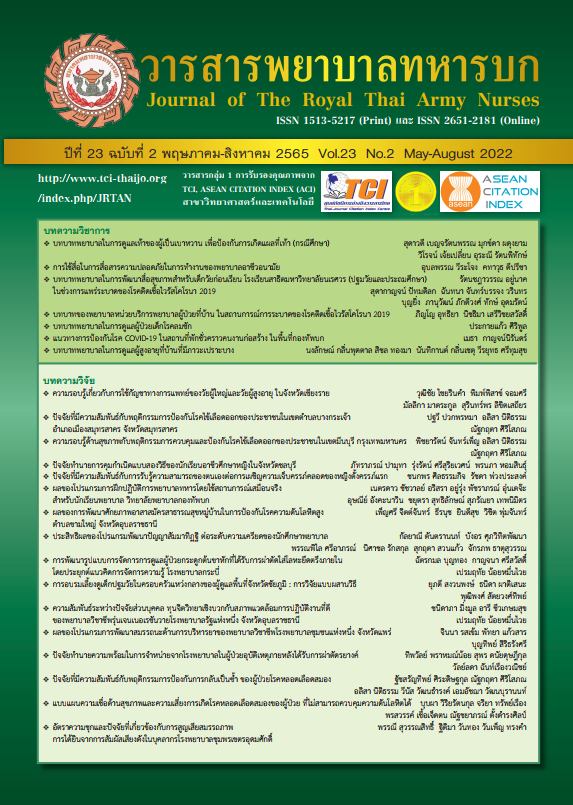Comparing Police Nursing Students’ Numeric Skills
Keywords:
nursing students, numerical skillsAbstract
This study aimed to explore the level of numerical skills among police nursing students and compare it between difference 4 years of study. The participants were 273 police nursing students and recruited by using purposive selection technique. Instrument used for data collection was the test of numerical skills. Its content validity was tested by three experts and reported as 1.00. It was tried out this instrument with forty nursing students who had similar characteristics with the study’s participants. Its reliability was tested using the KR-20 and found as .70. The mean item difficulty was .643 and mean discrimination index was .335. Data were analyzed using descriptive statistics and one-way ANOVA. Post hoc test was utilized to compare the mean differences among each pair by Scheffe’s method.
The results showed that police nursing students had low level scores of numerical skills (M = 35.52, SD = 9.03). Third year nursing students had the highest average of numeric skills scores (M = 40.05, SD. = 7.40), followed by the fourth year, second year, and first year nursing students respectively. The result about comparing the mean score of the overall numerical skills and three dimensions with police nursing students on the 4-year course, there were differences of (F = 31.476, 4.205, 16.986 and 24.178, respectively). Second year nursing students had significantly lower mean score of the overall numerical skills than third year nursing students. Each dimension of numerical skills, significantly difference in mean score of mathematical basic skill, it was found mean difference in the third year and fourth year nursing students (Mean Difference = .690, p < .05). However, First year students had the mean score of simple nursing calculation skill and complex nursing calculation skill significantly lower than third-, fourth- and second-year nursing students, respectively (p< .05).
Downloads
References
Government Gazette. Announcement of the Ministry of Education Standard Qualifications Framework for Undergraduate Program in Nursing Science year 2017.2018. p 7-11. (in Thai)
Trilling B, Fadel C. 21st Century Skills learning for life in our times. San Francisco: Jossey-Bass; 2009.
Boyer MJ. Math for nurse: A poket quide to dosage calculation and drug preparation 8ed. London: Lippincott-Raven Publishers; 2013.
Guneş UY, Baran L, Yilmaz DK. Mathematical and Drug Calculation Skills of Nursing Students in Turkey. International Journal of Caring Sciences 2016; 9(1): 220-227.
Brown DL. Does 1 + 1 still equal 2: A study of the mathematic competencies of associate degree nursing students. Journal of Nurse Educator 2002;27(3):132-145.
Laowarn L, Phunmanee A, Anutchatchaval S, Nakornratanachai P, Chaichangreet U. Medication Errors in Internal Medicine Wards at Srinagarind Hospital. Khon Kaen University Journal of Medicine 2015;1(3): 39-49. (in Thai)
Cheragi MA, Manoocheri H, Mohammadnejad E, Ehsani SR. Types and causes of medication errors from nurse’s viewpoint. Iranian Journal of Nursing Midwifery Reseach 2013;18(3): 228-31.
Police Nursing College. Program Specification Bachelor of Nursing Science Program B.E. 2018. (in Thai)
Police Nursing College. Report on the results of Bachelor of Nursing Science Program, academic year 2018-2020. (in Thai)
Montong A, Jamjang S, Kitnopkiat K. Factors Related to Self-Esteem of Nursing Students, Boromarajonani College of Nursing, Ratchaburi. Academic Journal of Phetchaburi Rajabhat University 2021;11(2): 146-156. (in Thai)
Indhraratana A, Prajankett O, Julawong O, Arayathanitkul B, Chaloeykitti S, Wongsaita N. The development of a training program for enhancing the competency of learning and teaching by using English as a medium of instruction. Journal of The Royal Thai Army Nurses 2016;17(2): 184-193. (in Thai)
Cebeci F, Karazeybek E, Sucu G, Kahveci R. Nursing students’ medication errors and their opinions on the reasons of errors: A cross-sectional survey. Journal of the Pakistan Medical Association 2015;65(5): 457-462.
Stolic S. Educational strategies aimed at improving student nurse’s medication calculation skills: A review of the research literature. Journal of Nurse Education in Practice 2014;14: 491-503.
Turner K, eungratanamart L, Niranrat S, Jarnarerux J, Wattanakull B, Reunreang T. Twenty First Century Skills of Nursing Students of Boromarajonani College of Nursing, Chonburi. Nursing Journal of the Ministry of Public Health 2015;25(2): 178-193 (in Thai)
Polgaya O, Wongnoi A. Job Satisfaction and 21st Century Skills of the Graduates, Boromarajonani College of Nursing, Chakriraj. Journal of Education and Human Development Sciences 2018;2(2): 69-77. (in Thai)
Thasaneesuwan S, Narkthong N, Chuaytaen T, Mukpradab S, Puttakun N. Preparation for Nurse Licensure Examination in Adult Nursing Among Fourth-Year Nursing Students, Faculty of Nursing, a University in Southern Thailand. Songklanagarind Journal of Nursing 2019;39(1): 105-115. (in Thai)
Bangthamai P, Srisomphan K, Somnukprasert W, Weerawatthanodom W. Effects of Blended Learning and Childbirth Delivery Simulation Based Learning on Academic Achievement, Satisfaction and The Students’ Opinions Towards Teaching by Reflective Thinking of Nursing Students, Boromarajonani College of Nursing Nonthaburi. Journal of The Royal Thai Army Nurses 2020;21(3): 350-359. (in Thai)
Downloads
Published
How to Cite
Issue
Section
License
Copyright (c) 2022 Journal of The Royal Thai Army Nurses

This work is licensed under a Creative Commons Attribution-NonCommercial-NoDerivatives 4.0 International License.
บทความหรือข้อคิดเห็นใดใดที่ปรากฏในวารสารพยาบาลทหารบกเป็นวรรณกรรมของผู้เขียน ซึ่งบรรณาธิการหรือสมาคมพยาบาลทหารบก ไม่จำเป็นต้องเห็นด้วย
บทความที่ได้รับการตีพิมพ์เป็นลิขสิทธิ์ของวารสารพยาบาลทหารบก
The ideas and opinions expressed in the Journal of The Royal Thai Army Nurses are those of the authors and not necessarily those
of the editor or Royal Thai Army Nurses Association.






